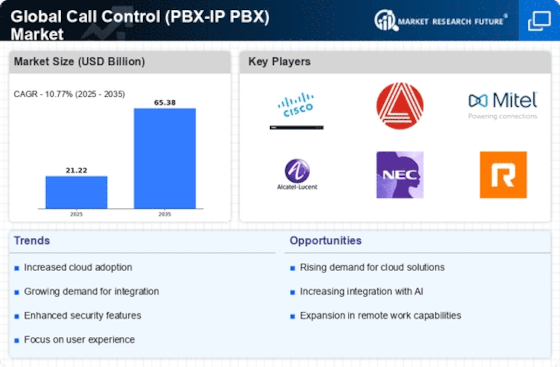Top Industry Leaders in the Call Control Market

The Competitive Landscape of the Call Control Market
The call control market, where phone calls dance to the tune of routing, features, and integrations, pulsates with innovation and intense competition. Understanding the strategies, key players, and future trends is crucial for businesses navigating this dynamic terrain and shaping how we connect and collaborate through voice communication.
Key Player:
- Cisco System, Inc
- Avaya
- Panasonic
- Mitel
- Alcatel-Lucent Enterprise
- NEC Corporation
- Call Control LLC
- Polycom LLC
- EIL Global
- ERGOMAN GmbH
- Voxter
- Ribbon Communications Operating Company Inc.
- Telynx
- Telus
Strategies Adopted by Leaders:
- Cloud-Based Solutions: Leading players prioritize flexible, scalable cloud-based call control platforms, catering to businesses seeking remote management, reduced infrastructure costs, and easy deployment. RingCentral and 8x8 excel in cloud-native solutions specifically designed for agile and growing companies.
- Unified Communications Integration: Integrating call control with other communication channels like email, video conferencing, and instant messaging provides seamless collaboration experiences. Microsoft Teams and Zoom leverage their existing communication platforms to offer integrated call control solutions.
- Security and Reliability: Robust security features like encryption, call recording, and disaster recovery are paramount for businesses handling sensitive data. Mitel and Alcatel-Lucent Enterprise focus on secure communication platforms ideal for government agencies and financial institutions.
- Mobility and Device Agnosticism: Enabling seamless call control across mobile devices, desk phones, and softphones ensures flexibility and accessibility for remote and hybrid workforces. Jabra and Plantronics specialize in integrating their headsets and speakerphones with various call control platforms for improved mobility.
- Focus on AI and Automation: Integrating AI-powered call routing, virtual assistants, and chatbots enhances efficiency and reduces human intervention. Google Cloud Communications and Genesys Cloud CX focus on intelligent automation solutions for streamlined customer service and support operations.
Factors for Market Share Analysis:
- Brand Reputation and Technological Expertise: Established players like Cisco and Avaya hold an advantage with proven track records, extensive research and development capabilities, and strong relationships with large enterprises and telecom providers. This legacy inspires trust and facilitates large-scale deployments.
- Product Portfolio Breadth and Functionality: Offering a diverse range of call control features, integrations, and deployment options caters to different business needs and sizes. Microsoft Teams' broad portfolio and RingCentral's focus on user-friendly interfaces exemplify this approach.
- Global Reach and Customer Support: Having a broad geographical reach and responsive customer support infrastructure is crucial for competing in a globalized market. Cisco's global network and Avaya's regional service centers offer advantages.
- Compliance with Regulations and Security Standards: Adapting to evolving privacy regulations and data security standards is paramount. Mitel's focus on HIPAA compliance and Alcatel-Lucent Enterprise's adherence to GDPR regulations set examples in their respective areas.
- Focus on Future Technologies and New Applications: Investing in research and development of next-generation technologies like WebRTC, integration with IoT devices, and voice biometrics positions companies for future market leadership. Google Cloud Communications' focus on WebRTC-based solutions and Genesys Cloud CX's AI-powered omnichannel engagement platform exemplify this strategic approach.
New and Emerging Companies:
- Fuze: Pioneering cloud-based video conferencing solutions with integrated call control features, catering to businesses seeking unified communications platforms with a video-centric focus.
- Dialpad: Specializing in mobile-first call control solutions with AI-powered call analytics and automation capabilities, targeting businesses with remote and mobile workforces.
- OpenPhone: Focused on open-source and flexible call control APIs for developers and businesses seeking customized communication solutions, promoting platform independence and integration with existing software stacks.
- Acqua Communications: Developing call control solutions specifically designed for contact centers, offering advanced routing, reporting, and agent management features for streamlined customer service operations.
Latest Company Updates:
Cisco Systems, Inc.:
- October 20, 2023: Cisco unveils its next-generation cloud-based call control platform, Cisco Webex Calling Premium, featuring advanced integrations with AI-powered analytics, security features, and collaboration tools, targeting large enterprises and hybrid workforces
- July 6, 2023: Cisco collaborates with a leading mobile network operator to develop a cloud-native call control solution specifically designed for 5G networks, enabling high-capacity voice services and integration with advanced mobile applications
Avaya:
- October 19, 2023: Avaya introduces its latest on-premises call control platform, Avaya Aura R12, with enhanced scalability, simplified management, and improved integration with third-party communication and productivity tools, catering to organizations seeking flexibility and hybrid deployment options
- July 5, 2023: Avaya acquires a cloud-based contact center technology provider, expanding its portfolio and reaching new market segments with AI-powered routing, omnichannel engagement, and self-service automation features









